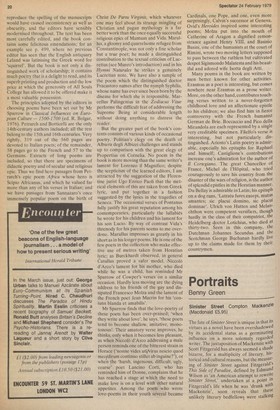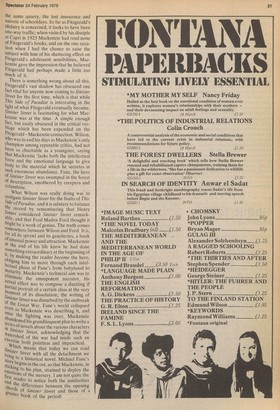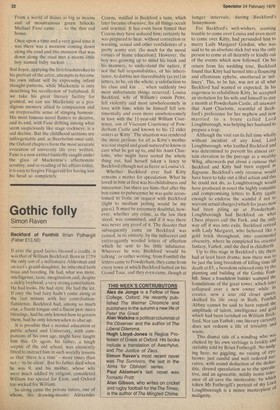Portraits
Benny Green
Sinister Street Compton Mackenzie (Macdonald £5.95) The fate of Sinister Street is unique in that its virtues as a novel have been overshadowed by its accidental status as a germinating influence on a more solemnly regarded writer. The juxtaposition of Mackenzie with Scott Fitzgerald has always seemed a shade bizarre, for a multiplicity of literary, historical and cultural reasons, but the measuring of Sinister Street against Fitzgerald s This Side of Paradise, defined by Edmund Wilson as 'an American attempt to rewrite Sinister Street,' undertaken at a point in Fitzgerald's life when he was 'drunk with Mackenzie', soon reveals that these unlikely literary bedfellows were stalking the same quarry, the lost innocence and naivete of schooldays. So far as Fitzgerald's idolatry is concerned, it looks to have been one-way traffic; when visited by his disciple at Capri in 1925 Mackenzie had read none of Fitzgerald's books, and on the one occasion when I had the chance to raise the subject with him of his shattering effect on Fitzgerald's adolescent sensibilities, Mackenzie gave the impression that he believed Fitzgerald had perhaps made a little too much of it.
There is something wrong about all this. Fitzgerald's vast shadow has obscured one fact vital for anyone now coming to Sinister Street for the first time, which is that while This Side of Paradise is interesting in the light of what Fitzgerald eventually became, Sinister Street is fascinating for what Mackenzie was at the time. A simple enough fact, but easily obscured in the critical verbiage which has been expended on the Fitzgerald Mackenzie connection. Wilson, who was to end his days as Mackenzie's only champion among reputable critics, had not been so charitable as a youngster, saying that Mackenzie 'lacks both the intellectual force and the emotional language to give body to the material which he secretes in such enormous abundance. Fane, the hero of Sinister Street was swamped in the forest of description, smothered by creepers and Columbine.
What Wilson was really doing was to Castigate Sinister Street for the faults of This Side of Paradise, and it is salutary to balance the record by remembering that Henry James considered Sinister Street remarkable, and that Ford Madox Ford thought it might be a work of genius. The truth comes somewhere between Wilson and Ford. It is, for all its sprawl and its gaucheries, a book Of unusual power and attraction. Mackenzie at the end of his life knew he had done Something extraordinary at the beginning of by making the reader become the hero, obliging him to move through each intellectual phase of Fane's from babyhood to maturity. Mackenzie's technical aim was to eliminate the omnipotent narrator, his actual effect was to compose a ,dazzling if Partial portrait of a certain class at the very 112°ment of its dissolution; the writing of 31n1ster Street was disturbed by the outbreak el the Great War. Fane's world collapsed even as Mackenzie was describing it, and once the fighting was over, Mackenzie asbandoned his grandiloquent plan to write a cries of novels about the various characters In Sinister Street, acknowledging that the watershed of the war had made such an exercise both pointless and impractical. _ Which means that today we can read 3,m.ister Street with all the detachment we tsptri rI6 to a historical novel. Michael Fane's s 0. rY begins in the cot, so that Mackenzie, in eticking to his plan, strained to deploy the „Motions of the nursery. I am not quite the iairst reader to notice both the similarities d the differences between the opening chords of Sinister Street and those of a greater book of the period: From a world of daises as big as moons and of mountainous green hillocks Michael Fane came . . . to the thin red house.
Once upon a time and a very good time it was there was a moocow coming down along the road and this moocow that was down along the road met a nicens little boy named baby tuckoo . . .
But Joyce, applying the first brushstrokes to his portrait of the artist, attempts to become his own infant self by expressing infant thought-patterns, while Mackenzie is only describing his recollection of babyhood. If we take his great literary facility for granted, we can see Mackenzie as a prodigious memory allied to compassion and an irrepressible sense of stinging humour. His most famous novel flatters to deceive, and its end, with Fane drifting among what seem suspiciously like stage cockneys, is a sad decline. But the childhood sections are unforgettable and, as Beerbohm once said, the Oxford chapters form the most accurate evocation of university life ever written. Fane is a now extinct butterfly caught under the glass of Mackenzie's affectionate scrutiny, and re-reading of his affairs today, it is easy to forgive Fitzgerald for having lost his head so completely.




































 Previous page
Previous page